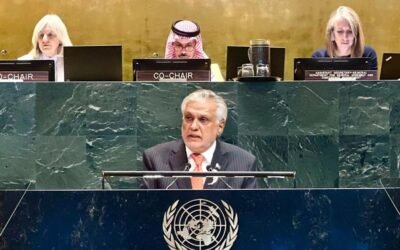Pakistan’s Long Reliance on the OIC
For Pakistan, the Organization of Islamic Cooperation (OIC) has long been the principal multilateral body for rallying Muslim-world support on two central foreign policy causes: Kashmir and Palestine. Over the decades, Islamabad has relied on the 57-member bloc to keep both issues alive on the global stage, particularly when other international forums have failed to deliver. In 2025, with Gaza still under siege and India’s unilateral actions in Kashmir entering their sixth year, the question persists: does OIC support deliver results or remain largely symbolic?
You May Read Like This: Pakistan’s Diplomatic Balancing Act in the Middle East
Kashmir on the 2025 Agenda
At the OIC’s 51st Council of Foreign Ministers (CFM) held in Istanbul in June 2025, Pakistan once again pressed for ‘tangible actions’ on Kashmir. The meeting of the OIC Contact Group on Jammu & Kashmir, attended by Saudi Arabia, Türkiye, Azerbaijan, Niger, and Pakistan, reaffirmed support for the Kashmiri right to self-determination under UN resolutions. The group condemned rights violations and stressed the urgency of international scrutiny.
While these declarations demonstrate that the OIC has not abandoned Kashmir, their impact remains limited. The organization has no enforcement authority, and several OIC member states maintain deep economic ties with India, reducing the likelihood of collective punitive measures. Nevertheless, the OIC’s Independent Permanent Human Rights Commission (IPHRC) continues to highlight abuses in Kashmir, giving Pakistan valuable material to use in international diplomacy.
OIC’s Palestine Track: Beyond Rhetoric?
On the Palestine issue, the OIC has shown more proactive engagement in recent years. Since the outbreak of Israel’s war on Gaza in late 2023, the bloc has held emergency summits, coordinated humanitarian relief, and mobilized legal diplomacy. Significantly, in January 2024 the OIC publicly supported South Africa’s genocide case against Israel at the International Court of Justice. That move aligned the Islamic bloc with an international legal process that keeps the issue in the global spotlight and compels states to clarify their obligations under international law.
At its 51st CFM in Istanbul, the OIC went beyond routine condemnation. It called on member states and the broader international community to consider sanctions and punitive measures to pressure Israel into compliance with international law. This was one of the clearest indications in years that the bloc was willing to back concrete steps, even if implementation ultimately depends on national governments.
Humanitarian Action as Visible Support
One area where the OIC’s role is tangible is humanitarian relief. Saudi Arabia’s King Salman Humanitarian Aid and Relief Center (KSrelief) has led continuous aid airlifts for Gaza since 2023, and Pakistan itself dispatched fresh consignments of medical and food supplies in mid-2025 through Jordan and Egypt. These efforts, coordinated under the OIC framework, provide immediate relief to Palestinians under siege. While humanitarian action cannot end the conflict, it demonstrates OIC states acting decisively where they have the capacity.
You May Like to Read This: The “Islamic Emirate” Mirage
Symbolism Versus Substance
For Pakistan, the OIC’s record is mixed. On Kashmir, the organization ensures the dispute remains on the global agenda, but it has not shifted ground realities in Srinagar. On the Palestine issue, however, the OIC has taken stronger stances than in the past, through legal support at the ICJ, repeated calls for a permanent ceasefire, and even mention of sanctions. These actions suggest a slow but notable evolution from mere symbolism to more structured political engagement.
Still, the OIC cannot enforce its own decisions. Whether resolutions translate into outcomes depends on the willingness of member states to align their trade, diplomacy, and security policies with collective commitments. Without national follow-through, even the strongest ministerial statements remain aspirational.
The Way Forward for Pakistan
Pakistan’s June 2025 diplomacy showed how the OIC can still be leveraged effectively. To maximize the forum, Islamabad could push for:
- Turning Palestine resolutions into synchronized national steps, such as trade restrictions, increased UNRWA funding, and coordinated submissions at the ICJ and ICC.
- Institutionalizing OIC reporting on Kashmir to the UN Human Rights Council and pressing for access for international monitors.
- Expanding joint humanitarian frameworks, ensuring faster, pre-coordinated responses in future crises.
These measures would convert rhetorical solidarity into sustained policy outcomes.
Conclusion: A Platform, Not a Magic Wand
The OIC remains both a shield and a stage for Pakistan. It provides legitimacy, visibility, and solidarity, but it cannot by itself alter facts on the ground. The experience of 2024–25 shows that the organization is edging beyond symbolic declarations, especially on Palestine. For Pakistan, the challenge is to harness this momentum, ensuring that the OIC’s words translate into coordinated state action. The bloc may not be a magic wand, but if used strategically, it can still be a reliable diplomatic ally rather than an empty symbol.



























